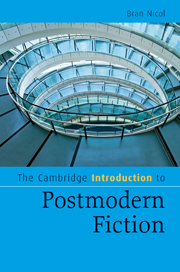Book contents
- Frontmatter
- Contents
- Acknowledgements
- Preface: reading postmodern fiction
- Introduction: postmodernism and postmodernity
- Chapter 1 Postmodern fiction: theory and practice
- Chapter 2 Early postmodern fiction: Beckett, Borges, and Burroughs
- Chapter 3 US metafiction: Coover, Barth, Nabokov, Vonnegut, Pynchon
- Chapter 4 The postmodern historical novel: Fowles, Barnes, Swift
- Chapter 5 Postmodern-postcolonial fiction
- Chapter 6 Postmodern fiction by women: Carter, Atwood, Acker
- Chapter 7 Two postmodern genres: cyberpunk and ‘metaphysical’ detective fiction
- Chapter 8 Fiction of the ‘postmodern condition’: Ballard, DeLillo, Ellis
- References
- Index
- Cambridge Introduction to …
Chapter 4 - The postmodern historical novel: Fowles, Barnes, Swift
Published online by Cambridge University Press: 05 June 2012
- Frontmatter
- Contents
- Acknowledgements
- Preface: reading postmodern fiction
- Introduction: postmodernism and postmodernity
- Chapter 1 Postmodern fiction: theory and practice
- Chapter 2 Early postmodern fiction: Beckett, Borges, and Burroughs
- Chapter 3 US metafiction: Coover, Barth, Nabokov, Vonnegut, Pynchon
- Chapter 4 The postmodern historical novel: Fowles, Barnes, Swift
- Chapter 5 Postmodern-postcolonial fiction
- Chapter 6 Postmodern fiction by women: Carter, Atwood, Acker
- Chapter 7 Two postmodern genres: cyberpunk and ‘metaphysical’ detective fiction
- Chapter 8 Fiction of the ‘postmodern condition’: Ballard, DeLillo, Ellis
- References
- Index
- Cambridge Introduction to …
Summary
Linda Hutcheon argues that the postmodern historical novel marks the return of ‘plot and questions of reference’ to postmodern fiction. Where both plot and referentiality were either disavowed in radical metafictional experimental writing – as in Barth's Lost in the Funhouse and Coover's Pricksongs and Descants – or endlessly problematized, because their authors' primary aims were to ‘explode realist narrative conventions’ (Hutcheon, 1988a, xii), by contrast, a work of ‘historiographic metafiction’ (her label for postmodern historical fiction) is still committed to telling a long and involving story, full of believable characters, which can be enjoyed by the reader in the manner of nineteenth-century realism. This explains why, of all the modes of fiction associated with postmodernism, historiographic metafiction has been ‘bestselling’ as well as the subject of serious academic attention. The three authors whose work we will consider in this chapter, John Fowles, Julian Barnes and Graham Swift – as well as others whom we shall consider in due course, such as Margaret Atwood and Salman Rushdie – have all enjoyed such dual acclaim. The postmodern historical novel is therefore what we might think of as ‘the acceptable face of postmodernism’ in literary fiction, influenced by postmodern ideas about fictionality and its relationship with reality, but also popular with a general readership on a mass scale.
As Hutcheon's term suggests, historiographic metafiction is a self-conscious work of fiction concerned with the writing of history.
- Type
- Chapter
- Information
- The Cambridge Introduction to Postmodern Fiction , pp. 99 - 120Publisher: Cambridge University PressPrint publication year: 2009



